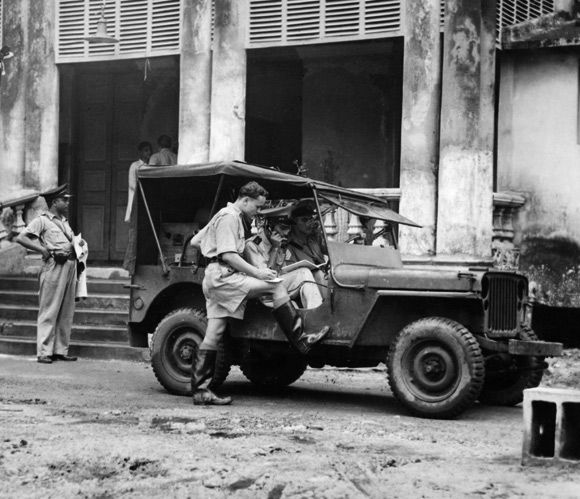'Even apart from the Bengal famine, there was a great deal more bloodshed and deceit than I was prepared for.'
'Almost every one of the acquisitions was won by extreme extortionate methods and what came out was that these relatively honest officers found themselves doing very dishonest things.'
Kanika Datta speaks to Ferdinand Mount, whose The Tears Of The Rajas is a refreshing departure from The Jewel In The Crown brand of Raj histories.

J W Marriot's property in Delhi's Aerocity is an incongruous place to re-read parts of The Tears Of The Rajas, as I wait for its author, Ferdinand Mount. This splendid history, evoking the kaleidoscopic world of heat, dust, blood, gore, disease, betrayal and wheeling-dealing that was the British Raj, is a universe away from the tranquil, if formidable post-modern opulence of this hotel.
We're catching lunch at K3, its multi-cuisine restaurant, between Mount's arrival from the Chennai lit fest that afternoon and his departure to the Jaipur lit fest that evening.
We miss each other in the vast lobby so I find Mount waiting at K3, nursing, I am secretly delighted to note, a tall glass of beer, which means I can order a glass of wine.
We briskly opt for the buffet but Mount frugally confines himself to the vegetables, saying he prefers to be vegetarian. I load up on salmon, slices of roast pork, sauted bell peppers, arugula leaves and asparagus -- regulation items in a five-star buffet today that would have been scarce just 15 years ago.
The Tears Of The Rajas, a 600-odd page door-stopper that will shortly be published in paperback, is an unusual history on several counts. It is narrated through the story of Mount's ancestors, quintessential Lowland Scots who endured chronic ill health and physical danger to serve the Empire and, of course, make their fortunes.
It speaks volumes for his family's ubiquity in the empire that Mount covers a pretty broad canvas of British rule in India, dredging up memories of half-forgotten incidents and highlighting hitherto unknown ones between 1805 and 1905.
More to the point, The Tears Of The Rajas is a refreshing departure from the mawkish The Jewel In The Crown brand of nostalgia that has informed popular Raj histories, a perspective that somehow segued into the view of some academics that the Empire was a force of modernity.
Mount, a journalist by profession who says he is 'easing' his way into history writing for the London Review Of Books and The Times Literary Supplement, takes no sides, so there are no heroes in his book. I am surprised, though, when he says it was well received in the UK because I recall the hostility that greeted William Dalrymple's 2002 book White Mughals, an account of liaisons between senior British officers and Indian women.
"When Willy first started publishing you did have that kind of resistance," he acknowledges. "But now most people in Britain are ready to take a cooler and more dispassionate look at those two centuries of British rule. I spoke to Scottish audiences, the children and grandchildren of old India hands -- Indian army, tea and indigo planters -- and when I describe some of the atrocities and counter-atrocities, people didn't say that didn't happen."
I tell him that despite his even-handed approach, the book made me freshly indignant. "You are meant to be indignant," he replies. "What was wrong was the bland version of Indian history that we taught in school, which made it all sound very smooth. Even apart from the Bengal famine, there was a great deal more bloodshed and deceit than I was prepared for. Almost every one of the acquisitions was won by extreme extortionate methods and what came out was that these relatively honest officers found themselves doing very dishonest things."
The takeover of part of Hyderabad comes readily to mind because he had explored the former British Residency, now under restoration, on this trip. "I crept into it at twilight. I knew it very fine architecturally but I wasn't prepared for the size of it -- it made the Charminar look like a rather large suburban villa."
That episode was 'particularly shameful on my ancestor John Low's part because he had been on record saying we treated the Nizam very badly and he was only in debt because we forced him to maintain this huge army and it would have been perfectly possible to arrange for his debts to be rolled over." But Dalhousie (the governor general) wasn't having any of that. And because Low was himself in debt he took the job and imposed this extremely oppressive treaty."
Mount's ancestors saw service in the Raj rather than other parts of the Empire, but there was an exception about whom he says he would like to write about some day.
This was a character called William Shakespear, who joined the Indian Civil Service but was seconded to West Asia where he became a district officer in Arabia.
Captain Shakespear was the first person to make contact with the Wahhabi-influenced House of Saud at the end of the 19th century. "He was fascinating because he said to his bosses, 'These Wahhabis are wonderful, they are austere, honest, children of the desert and we should ally with them.' His was the pioneering role of giving them the seal of British government approval."
Now we know who to blame for the mess in West Asia, I joke, as we head for the main course. There's a wide choice but Mount skips all of it for a plateful of Indian dessert -- rabri, pedas and so on -- which he says he adores. I help myself to a desultory Chinese spread of dim sums and spicy sauted prawns.
Mount may have been born too late to serve the Raj, but his life was no less unusual, facts I glean from reviews of his well-received memoir Cold Cream. It was upper-class Establishment certainly -- his first cousin Mary is British Prime Minister David Cameron's mother -- but unconventional in that his father was a gentleman jockey.
The upshot of that was that he "absolutely hated horses, I regarded them as nasty, dangerous animals." but he enjoyed his "ramshackle country upbringing."
The education, though, was regulation upper class. School at Eton -- "now something to keep quiet about," he says with self-deprecating humour -- then ChristChurch, Oxford, where he read French and German.
I say I am struck by the fact that many Britons opted to read German and mention John le Carre, the pen name of David Cornwell whose biography I had just read, when he tells me the novelist taught him at Eton.
How marvellous, how lucky, was he a good teacher? "He was absolutely wonderful, a teacher of genius," Mount says, but he was also a brilliant mimic. "So when these spoilt, naughty, boys at the back started trying to tease him in their languid voices, he would imitate them perfectly and make them feel very foolish."
Mount remembers everyone being very sad when they heard "Corns has gone off to be a spy -- though I don't know how we knew that."
Mount had also worked in Margaret Thatcher's policy unit, but that was actually his second stint with the Iron Lady. His first was when he was assigned her assistant as a newly elected Tory MP.
"I thought we got on very badly. She thought I was idle -- she wasn't wrong -- however, 20 years later when she became prime minister, she invited me to join the unit."
Did he like her personally? "Frankly, I don't think I knew her any more than you do. In fact, I don't think she wanted to be liked. She was very nice to her staff, but horribly rude to her Cabinet colleagues -- very unvarnished and direct."
Over black coffee (for him) and jasmine tea (for me), I apologetically ask him the inevitable: How he assessed Cameron. "You know, he's not just a smooth, upper-class boy, he's an extremely efficient political operator and he did incredibly well to keep the coalition together when everyone predicted it would fall apart in months and then to win the election."
That was a turn-up for the books, I say, since no one gave him an outside chance. Neither, it seems, did Mount, who won, to his astonishment, several hundred pounds placing a wild bet on Cameron's victory.
Mount's dispassionate view of history comes as a relief when set against the insanely ill-informed distortions of the past in the public discourse in India. And then, we get the campaign in Oxford to pull down the statue of Cecil Rhodes. What did he think? His answer leaves me giggling.
"The Rhodes Must Go campaign seems fairly ridiculous to me, not least because its leader is a Rhodes Scholar. It's hard to think of an Oxford or Cambridge college that wasn't founded by a dubious rogue, not excluding my own, ChristChurch, the brainchild of Cardinal Wolsey."
"The robber barons of the gilded age in America bought themselves respectability by endowing hospitals, museums, universities and national parks."
"Would we rather they had spent the money on their own pleasures alone?"








 © 2025
© 2025